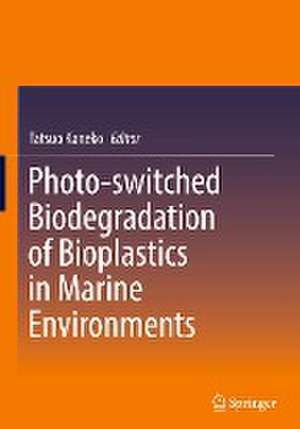Photo-switched Biodegradation of Bioplastics in Marine Environments
Editat de Tatsuo Kanekoen Limba Engleză Hardback – 27 sep 2023
Preț: 949.73 lei
Preț vechi: 1158.20 lei
-18% Nou
Puncte Express: 1425
Preț estimativ în valută:
181.73€ • 189.74$ • 150.40£
181.73€ • 189.74$ • 150.40£
Carte disponibilă
Livrare economică 15-29 martie
Preluare comenzi: 021 569.72.76
Specificații
ISBN-13: 9789819943531
ISBN-10: 9819943531
Pagini: 152
Ilustrații: VII, 152 p. 104 illus., 42 illus. in color.
Dimensiuni: 178 x 254 mm
Greutate: 0.57 kg
Ediția:1st ed. 2023
Editura: Springer Nature Singapore
Colecția Springer
Locul publicării:Singapore, Singapore
ISBN-10: 9819943531
Pagini: 152
Ilustrații: VII, 152 p. 104 illus., 42 illus. in color.
Dimensiuni: 178 x 254 mm
Greutate: 0.57 kg
Ediția:1st ed. 2023
Editura: Springer Nature Singapore
Colecția Springer
Locul publicării:Singapore, Singapore
Cuprins
1. Introduction.- 2. Next-generation bioplastics with photo-responding degradation.- 3. Processing of bioplastics with photo-responding degradation.- 4. Photocatalyst development for bioplastics with photo-responding degradation.- 5. Organic/inorganic composite development for photo-responding degradation.- 6. Microorganism engineering for next-generation bioplastics.- 7. Biodegradation evaluation for next-generation bioplastics.- 8. Toxicity evaluation for next-generation bioplastics.
Notă biografică
Dr. Tatsuo Kaneko is currently a chair professor at Jiangnan University and was a project manager of moon-shot project for bioplastics with marine degradation selected in Cabinet Office of Japanese government. His research interests include polymer sciences such as gels, soft matters, polyelectrolytes, bio-derived plastics, and biodegradable plastics. Based on these field, more than 230 papers in high-impact journals were published, and he is the author of more than 10 review/book chapters. He won 3 international and 12 domestic awards in this field. He has 25 years of teaching experiences at 5 national universities in Japan and at 1 university in the USA as a visiting faculty.
Textul de pe ultima copertă
This book presents the novel concept of photo-switched biodegradation of bioplastics which is one of the important methods to overcome plastic waste issues in oceans. The different chapters discuss topics associated with a wide range of biorefinery plant cultivation, cell bioengineering in silico/wet, plastic design with photo-controlled biodegradation, photocatalysis design, evaluation of biodegradability, polymer toxicity, and plastic edibility. The book contributes to various Sustainable Development Goals such as SDG 14—Life Below Water; SDG 9—Industry, Innovation and Infrastructure; SDG 12—Responsible Consumption and Production; and SDG 15—Life on Land. It is a useful source for academic scientists in the fields of organic chemistry, photocatalysts, organic/inorganic composites, cell biology, plant biology, plastic processing, social control of wastes, environmental science, marine technology, and engineers. The book plays a big part in paradigm-changing innovation and transforms the petrochemical industry which has reached maturity, into a biochemical industry.
Caracteristici
Proposes a new concept of polymer design for degradable plastics Introduces novel methodology of bioplastic development, biodegradation, and toxicity evaluation Provides a new solution to the ocean plastic wastes global problem
